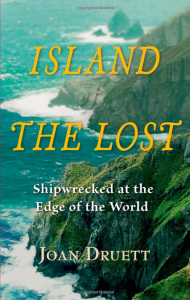 I’ll say it again: I love maritime history.
I’ll say it again: I love maritime history.
I love how ships and the sea so heavily influenced — and continue to influence — the world around us.
Maritime non-fiction reading satisfies my craving for a time when men were really men – not softies like most men today, with their smart phones, tablet computers, paper cuts, cubicles, facial lotions and pedicures.
My latest read is Island of the Lost: Shipwrecked at the Edge of the World, by Joan Druett.
Summary
It’s the true story of Captain Thomas Musgrave and his crew of four, who shipwrecked their schooner Grafton in 1864 on subantarctic Auckalnd Island, 285 miles south of New Zealand. They should’ve died from harsh conditions or gone mad (or both), but Captain Musgrave’s democratic leadership, moral compass and incredible resourcefulness kept them going for nearly two years.
With lost hope and little chance of being rescued, they transformed the Grafton’s skiff into a small seaworthy sailboat, and Musgrave and two crew members risked their lives sailing through treacherous storms to reach the southern tip of New Zealand. After recovering, Musgrave faced death again to embark on a rescue mission back to Auckland Island, where they successfully picked up the two remaining crew.
At the same time the survivors of the Grafton tackled Auckland Island, the sailing ship Invercauld wrecked during a storm only a few miles up the coast. There were nineteen castaways, mostly doomed under the pathetic leadership of Captain George Dalgarno. Motivated by social prestige and selfishness, Dalgarno’s leadership failings resulted in rampant starvation, frostbite and cannibalism — leaving only three survivors. Dalgarno was one of the lucky ones, thanks to a socially inferior carpenter’s skills and resourcefulness.
Personal Impact
Both stories are incredible survival tales and tragedies on their own — with the former having a happier ending. But it is the the juxtaposition of the two crews’ fates — at the same time on the same island — that makes this story particularly awesome. The success of Musgrave and the failure of Dalgarno underscores why it is so important for leaders to embrace moral responsibility, endurance, compassion and mutual respect of colleagues.
Fast-forwarding to our comfortable 21st century Western society, I can think of many cases where people in positions of power in politics and business have ascended with motivations similar to Dalgarno’s — social prestige and selfishness. Sure, many can rise to power. But it often takes dire situations to truly test one’s leadership ability.
That’s why when you’re voting for leaders, appointing leaders, or joining leaders as part of some organization or movement, it’s critical to scrutinize them based on their ability to rise to the occasion when things go abysmal.
What truly are your leaders’ motivations? Selfishness or purpose?
I doubt the crews of the Grafton and Invercauld asked that themselves that question when signing on to their routine commercial voyages, even though it meant the difference between life and death.
